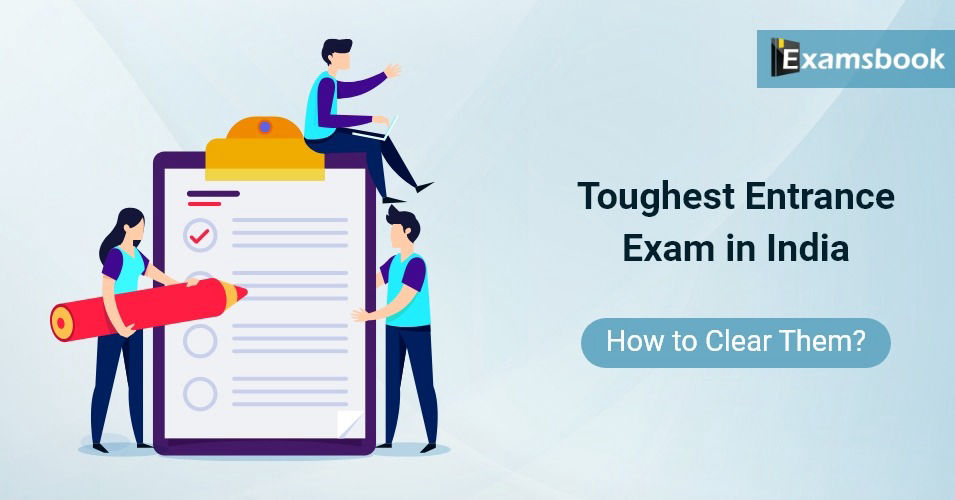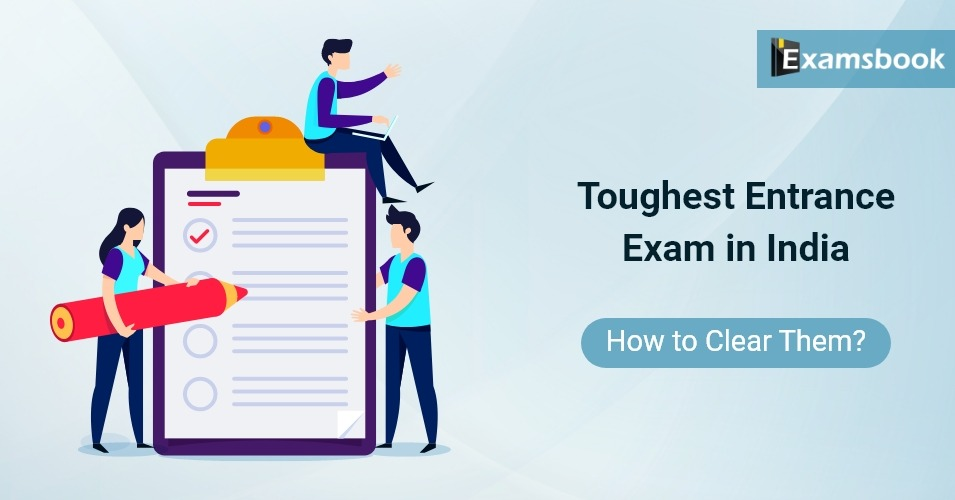


Entrance exams in India are becoming increasingly complex every year due to the numerous aspirants vying for a limited number of seats in prestigious educational institutions.
If you also want to succeed in today's competitive world, you must be competent. Competition exists in every field. India is known for its competitive examination landscape. Although all the exams are difficult in themselves and students have to work hard to succeed, there are some exams we can call difficult exams in India.
So in this blog, we are going to discuss the top toughest exams in India. Also, cracking these exams is not easy, so we will also throw light on some preparation tips.
Here are five highly competitive and challenging exams in India:
UPSC exam is conducted for recruitment into various prestigious civil services of the Government of India, including the Indian Administrative Service (IAS), Indian Foreign Service (IFS), and Indian Police Service (IPS). It is known for its extensive syllabus, rigorous selection process, and the high level of competition.
The three-stage exam process includes the Preliminary Examination, Main Examination, and Personal Interview.
| Particulars | UPSC Exam |
| Conducting Body | UPSC – Union Public Service Commission |
| Exam Level | National |
| Exam Periodicity | Yearly |
| Exam Mode | Offline |
| Exam Type | Pen-Paper; OMR sheet |
| UPSC Exam Date 2023 | UPSC Prelims 2023 conducted on 28th May 2023 & Mains 2023 will be conducted from 15th September 2023. |
The toughest entrance exam in India is often considered to be the Joint Entrance Examination (JEE) Advanced. The IIT JEE Advanced exam is the gateway to admission into the prestigious Indian Institutes of Technology (IITs) for undergraduate engineering programs.
It is known for its challenging questions that require deep conceptual understanding and problem-solving skills. Only the top candidates who qualify the preceding exam, JEE Main, are eligible to appear for JEE Advanced.
JEE Advanced is a comprehensive test that assesses a student's knowledge in subjects like physics, chemistry, and mathematics. The exam pattern includes multiple-choice questions, numerical answer type questions, and questions that require lengthy calculations and conceptual understanding.
| Particulars | IIT JEE |
| Conductedby | National Testing Agency |
| Exam Level | National Level Exam |
| Mode | Computer-based and pen-paper-based test |
| Type of Questions | Objective Type or Multiple Choice Questions (MCQs) |
| Languages in which the exam is conducted | Assamese, Bengali, English, Gujarati, Hindi, Kannada, Malayalam, Marathi, Oriya, Punjabi, Tamil, Telugu, Urdu |
| Subjects | Paper 1: Physics, Chemistry, and Mathematics Paper 2: Mathematics, Aptitude Test, and Drawing Test |
| Total Marks | 360 for Paper 1 and 390 for Paper 2 |
NEET is the entrance exam for admission to undergraduate medical and dental courses (MBBS/BDS) in India. With a vast syllabus (11th and 12th level) covering Physics, Chemistry, and Biology, and the intense competition for limited seats, this toughest medical entrance exam is conducted annually in May and offers 90,000 seats in MBBS and BDS Colleges in the country.
NEET attracts a vast number of applicants each year, and the level of competition is intense. Aspiring medical and dental students from across the country prepare rigorously for this exam, which adds to the overall difficulty.
| Particulars | NEET |
| NEET Full-Form | National Eligibility Entrance Test |
| Exam Frequency | Once a year |
| Exam Type | Medical and Dental entrance test |
| NEET Exam Mode | Offline |
| NEET Exam Duration | 3 hours and 20 minutes |
| Accepting Colleges | 355 medical colleges and 125 dental colleges |
CAT is a highly MBA entrance exam (Master of Business Administration) conducted for admission to prestigious Indian Institutes of Management (IIMs) and other top management institutes in India.
The CAT exam assesses candidates' aptitude in several areas, including Verbal Ability and Reading Comprehension (VARC), Data Interpretation and Logical Reasoning (DILR), and Quantitative Ability (QA). The exam consists of multiple-choice questions (MCQs) as well as non-MCQs. The duration of the exam is usually around 180 minutes (3 hours).
The CAT exam is usually conducted once a year, typically in November or December. Candidates need to register online on the official CAT website during the designated registration period. The exam is conducted across multiple test centers in various cities throughout India.
| Particulars | CAT |
| CAT Full-Form | Common Admission Test |
| CAT Official Website | iimcat.ac.in |
| Exam Conducting Body | One of the IIMs on a rotational basis CAT 2023 will be conducted by IIM Lucknow |
| Exam Type | National Level, MBA Entrance Exam |
| Exam Frequency | Once a year |
| Exam Mode | Online |
| Language | English |
GATE is the most popular competitive examination conducted in India for admission to postgraduate programs in engineering, technology, and architecture, as well as for recruitment in various public sector undertakings (PSUs). The difficulty level of the GATE exam can vary depending on the perspective of the candidates and their level of preparedness.
The GATE exam covers a wide range of topics from undergraduate engineering and science disciplines. The syllabus is comprehensive, and candidates are expected to have a strong understanding of the fundamental concepts in their respective disciplines.
| Particulars | GATE |
| GATE Exam Full-Form | Graduate Aptitude Test in Engineering |
| Exam Conducting Body | Conducted jointly by the Indian Institute of Science (IISc) Bangalore and seven Indian Institutes of Technology (IITs). |
| GATE 2023 conducting Institute | IIT Kanpur |
| Exam Type | National Level |
| Exam Frequency | Once a year |
| Exam Mode and Type | Online; MSQ/MCQ/NAT |
| Language | English |
| GATE Exam Duration | 3 Hours |
Cracking tough entrance exams in India requires a well-planned and disciplined approach. While the specific strategies may vary depending on the exam, here are some general tips to help you prepare and increase your chances of success:
Gain a comprehensive understanding of the exam pattern, syllabus, and marking scheme. Analyze previous years' question papers to identify the important topics and question trends. This will help you develop a targeted study plan.
Identify your strengths and weaknesses in different subjects and topics. Allocate more time to strengthen your weak areas while maintaining and refining your strengths. This balanced approach will help you maximize your overall score.
Collect high-quality study material, including textbooks, reference books, study guides, and online resources. Use trusted sources recommended by experts or toppers. Make concise notes for quick revision.
Practice is key to cracking tough entrance exams. Solve a variety of practice questions, including previous years' papers, mock tests, and sample papers. This will help you understand the exam pattern, improve your speed, accuracy, and time management skills.
Take regular mock tests to simulate the actual exam environment. Analyze your performance, identify your strengths and weaknesses, and work on improving them. Focus on time management, question selection, and maintaining accuracy.
Focus on developing strong problem-solving skills, especially for exams with a logical reasoning or quantitative aptitude section. Learn and practice different problem-solving techniques, shortcuts, and formulas.
For exams that include a current affairs section, stay updated with national and international news, government schemes, economic developments, and important events. Read newspapers, magazines, and reliable online sources regularly.
Maintain a positive mindset and avoid unnecessary stress and anxiety. Believe in your abilities and stay confident in your preparation. Practice relaxation exercises, meditation, or other stress-management techniques to stay calm during the exam.
These are just a few examples of tough entrance exams in India, and there are several other exams conducted for admission to various professional courses, such as the Common Law Admission Test (CLAT), National Defense Academy (NDA), Air Force Common Admission Test (AFCAT), IBPS RRB, RBI and more.
It's important to note that the difficulty of these exams can vary based on individual strengths, preparation, and personal circumstances. Remember, cracking tough entrance exams requires consistent effort, dedication, and perseverance. Stay motivated, stay focused on your goals, and keep pushing forward. Celebrate small victories along the way and learn from any setbacks. With the right approach and hard work, you can increase your chances of success in cracking tough entrance exams in India .
Get the Examsbook Prep App Today